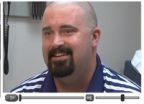NIH scientists reactivate immune cells exhausted by chronic HIV
2011-06-04
(Press-News.org) Scientists at the National Institute of Allergy and Infectious Diseases (NIAID), part of the National Institutes of Health, have demonstrated why certain immune cells chronically exposed to HIV shut down, and how they can be reactivated.
Healthy B cells have a balanced mix of surface proteins that the immune system can use, like the gas pedal and brake of a car, either to activate the cell or to damp down its activity. However, in people with long-term HIV infection who have not begun antiretroviral therapy, their B cells—responsible for producing anti-HIV antibodies—display a surplus of inhibitory receptors, the surface proteins used to apply the brakes on a B cell. Scientists from the NIAID Laboratory of Immunoregulation led by Lela Kardava, Ph.D., Susan Moir, Ph.D., and Anthony S. Fauci, M.D., NIAID Director and Chief of the laboratory, wanted to know if this phenomenon can help explain why B cells become "exhausted" and essentially shut down in people who are HIV-infected but treatment-naive.
To test their hypothesis, the scientists used molecules called small interfering RNAs (siRNAs), which acted at the genetic level to prevent exhausted B cells from replenishing inhibitory receptors. After treatment with siRNAs, the exhausted cells responded more normally to conditions that typically would spur a B cell into action, such as the presence of a virus, demonstrating that the excess of inhibitory receptors may explain why exhausted B cells are so unresponsive.
Because B cells generally are difficult to manipulate, the new siRNA-based approach may hold promise for scientists seeking to develop therapies to improve the human antibody response against HIV and other pathogens by altering the expression of specific B-cell genes.
###
ARTICLE:
L Kardava et al. Attenuation of HIV-associated human B cell exhaustion by siRNA downregulation of inhibitory receptors. The Journal of Clinical Investigation DOI:10.1172/JCI45685 (2011).
WHO:
Anthony S. Fauci, M.D., NIAID Director and Chief, NIAID Laboratory of Immunoregulation; and Susan Moir, Ph.D., Staff Scientist, NIAID Laboratory of Immunoregulation, are available to comment on this article.
CONTACT:
To schedule interviews, please contact Laura Sivitz Leifman, 301-402-1663, sivitzl@niaid.nih.gov.
NIAID conducts and supports research—at NIH, throughout the United States, and worldwide—to study the causes of infectious and immune-mediated diseases, and to develop better means of preventing, diagnosing and treating these illnesses. News releases, fact sheets and other NIAID-related materials are available on the NIAID Web site at http://www.niaid.nih.gov.
About the National Institutes of Health (NIH): NIH, the nation's medical research agency, includes 27 Institutes and Centers and is a component of the U.S. Department of Health and Human Services. NIH is the primary federal agency conducting and supporting basic, clinical, and translational medical research, and is investigating the causes, treatments, and cures for both common and rare diseases. For more information about NIH and its programs, visit http://www.nih.gov/.
END
ELSE PRESS RELEASES FROM THIS DATE:
2011-06-04
Los Angeles, Calif., June 2, 2011—Researchers in the Keck School of Medicine of the University of Southern California (USC), together with scientists in Beijing, China, have discovered a chromosomal mutation responsible for a very rare condition in which people grow excess hair all over their bodies. Investigators hope the finding ultimately will lead to new treatments for this and less severe forms of excessive hair growth as well as baldness.
The study, "X-linked congenital hypertrichosis syndrome is associated with interchromosomal insertions mediated by a human-specific ...
2011-06-04
CHICAGO — Customizing targeted therapies to each tumor's molecular characteristics, instead of a one-size-fits-all approach by tumor type, may be more effective for some types of cancer, according to research conducted by The University of Texas MD Anderson Cancer Center.
MD Anderson's Phase I findings were presented today on the opening press program of the 47th Annual Meeting of the American Society of Clinical Oncology. Apostolia-Maria Tsimberidou, M.D., Ph.D., associate professor in MD Anderson's Department of Investigational Cancer Therapeutics, and the study's principal ...
2011-06-04
AURORA, Colo. (June 3, 2011) – A drug that targets a specific type of lung cancer shows a dramatic response in more than half of the people who take it. The drug, called crizotinib, has been in clinical trials since 2006, and the results from the largest group of patients to take it within the first of these clinical trials are being presented at the annual meeting of the American Society of Clinical Oncology (ASCO).
The patients taking crizotinib have anaplastic lymphoma kinase (ALK) positive advanced non-small cell lung cancer (NSCLC) and the drug targets the gene ...
2011-06-04
(CHICAGO) – For patients with advanced melanoma, which is the most lethal type of skin cancer, the results of a large clinical trial show that a vaccine combined with the immune-boosting drug Interleukin-2 can improve response rate and progression-free survival.
The findings of the study were published in the June 2 issue of New England Journal of Medicine. This marks the first vaccine study in the disease and one of the first in all cancers to show clinical benefit in a randomized Phase III clinical trial.
"This is the first time that a vaccine has shown benefit ...
2011-06-04
CHICAGO --- When people finish treatment for cancer, they want to bounce back to their former vital selves as quickly as possible. But a new Northwestern Medicine study -- one of the largest survivor studies ever conducted – shows many survivors still suffer moderate to severe problems with pain, fatigue, sleep, memory and concentration three to five years after treatment has ended.
"We were surprised to see how prevalent these symptoms still are," said study co-investigator Lynne Wagner, an associate professor of medical social sciences at Northwestern University Feinberg ...
2011-06-04
The pristine state of unpolluted waterways may be their downfall, according to research results published in a paper this week in the journal Geophysical Research Letters.
A species of freshwater algae that lives in streams and rivers, called Didymo for Didymosphenia geminata, is able to colonize and dominate the bottoms of some of the world's cleanest waterways--precisely because they are so clear.
Didymo does so with a little help from its friends--in this case, bacteria--which allow it to make use of nutrients like phosphorus.
Blooms of Didymo, also known as "rock ...
2011-06-04
Malta - May 2011 - Celebrations are certainly underway in D. R.'s household today, because he has just won over $82,000 playing at Maple Online Casino. He won a few prizes while playing different games, which makes his winnings even more impressive.
D. R. won $61,522.00 while playing Hitman; $12,050.00 on Multi-Hand European Blackjack; and $9,350.00 while playing Classic Blackjack. Thus, all his winnings for the day equal $82,922.00.
Casino Manager, Charlotte Jackson, was available for comment. "Congratulations D. R. We are very proud of your accomplishments ...
2011-06-04
CHICAGO -- ASCO Abstract #10504. Contrary to what many oncologists had thought, a tumor suppressor protein known as PTEN does not reduce the effectiveness of the breast cancer drug Herceptin, according to a study by Mayo Clinic and North Central Cancer Research Group (NCCTG) investigators. The study, which looked at tumors from 1,802 patients enrolled in the NCCTG N9831 clinical trial, found that patients with HER2-positive breast cancer and had either a loss of PTEN functioning or normal PTEN activity did equally well when Herceptin was added to chemotherapy to prevent ...
2011-06-04
BOSTON--A duo of drugs, each targeting a prime survival strategy of tumors, can be safely administered and are potentially more effective than either drug alone for advanced, inoperable melanomas, according to a phase 1 clinical trial led by Dana-Farber Cancer Institute investigators.
The findings (abstract 8511), will be presented in an oral session at the annual meeting of the American Society of Clinical Oncology on Saturday, June 4, 3 p.m. CT, Arie Crown Theater, McCormick Place.
The drugs -- ipilimumab and bevacizumab -- are both monoclonal antibodies, intensified ...
2011-06-04
There are two low pressure areas in the Caribbean Sea for future development into tropical cyclones, although the chances are near zero for one, and minimal for the other. The GOES-13 satellite has been following the life of System 93L, which is one of those systems. The second low pressure area may not develop over the weekend, but threatens heavy rain in Hispaniola, Cuba and Jamaica.
The GOES-13 satellite provides images of the U.S. east coast, Atlantic and Caribbean Sea continually every day. In an image from 1731 UTC (1:31 p.m. EDT) today, June 3, the low pressure ...
LAST 30 PRESS RELEASES:
[Press-News.org] NIH scientists reactivate immune cells exhausted by chronic HIV


